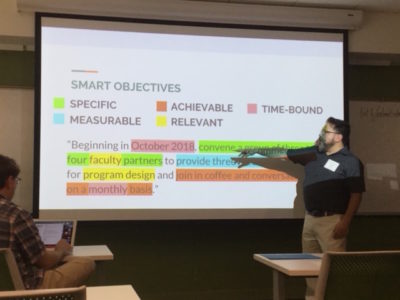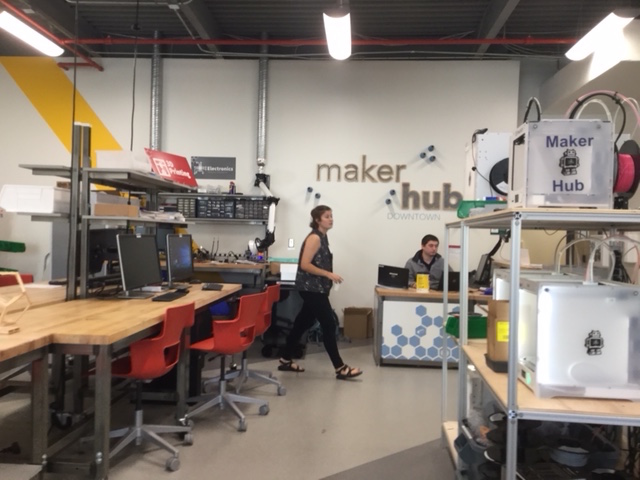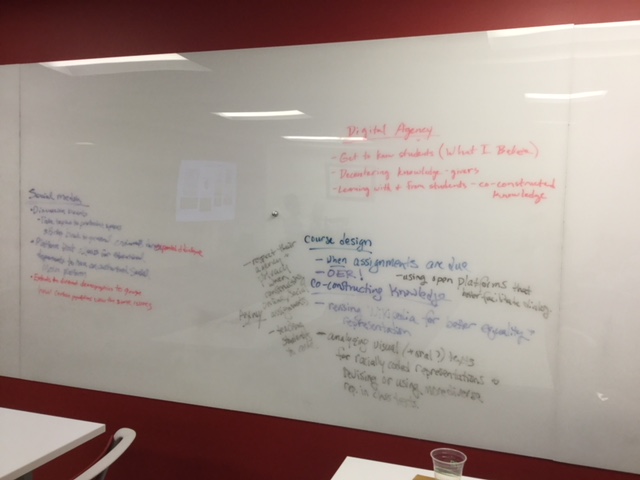ELON Teaching and Learning Conference 2018: Innovation, Makerspace Education, Critical Pedagogy & Bad Ideas

The annual Teaching and Learning Conference at Elon University is a free, regional event that brings together instructional designers, teachers, students, curriculum specialists and others interested in educational technology and pedagogical approaches from the research triangle in North Carolina. The 15th edition of this one-day conference took place on August 16th 2018.

Moner explains how to set strong goals.
Design Thinking
My first session challenged participants to work on an innovative idea. The ‘No-Limits’ Program Design and Innovation Workshop’ was delivered by William Moner and Phillip Motley, the Elon faculty members who initiated the Design Thinking Studio in Social Innovation. Participants worked through a series of individual and dyadic exercises to puzzle out the various aspects of their innovative project – a new course, a collaborative project, or an authentic assignment.
Slides are available online: bit.ly/nolimitselon
Making
Next, I had the chance to tour the Elon Makerspace and listen to the talk ‘Why Making Matters’ by Michael Vaughn, Instructional Technologist at Elon, and coordinator of the Makerspace. The role of making in education is typically framed in light of ‘constructionism’. However, Vaughn stated that over time, he recognized the valid criticisms of this theoretical foundation (e.g., Kirschner, 2006) and also felt uneasy with the one-sided attitude of some constructionist claims: ‘If you criticize traditional education as a one-size fits all approach, but then present making as a solution for everyone and anything, that’s a bit ironic.’
Vaughn presented an alternative answer to why making matters as an educational practice: Makerspaces expose students to routine failure and a multitude of roadblocks – it’s exposure therapy to maladaptive perfectionism. Which problem does it solve to offer a space where learners can comfortably fail? According to Vaughn, students are failing to learn. Though they may excel academically, and get good grades, this happens solely by succeeding to navigate the educational system, and comes with a loss of intellectual curiosity and lifelong learning motivation. Learning involves struggle, success requires effort, and learning depends upon the ability and willingness to tackle complicated ideas and concepts. Vaughn sees three reasons that this type of intellectual resilience is not pertinent in today’s student generation.
- Helicopter parenting (loss of agency)
- Praise (being smart is a label you can loose),
- Standardized testing (learning is a destination rather than a process).
As a result, students become apprehensive at trying something new, and avoid failure and confusion. Additionally, student populations present a growing percentage of depression and anxiety related disabilities. Makers mindsets – makers know what they know, and what they can learn. They understand that it takes time and effort to build something. They embrace failure. Makers don’t view a lack of success as a failure. “Just because you do not progress on something does not mean that you are not making progress”.

Makerhub at Elon University, NC
The Elon makerspace counted over 3,000 visits in the past academic year (2017-18), and is attracting a diverse population beyond STEM subjects. In addition, the makerspace team conducted activities such as the Marshmallow challenge and balloon powered vehicle building in 50 classes.
Critical Digital Pedagogy
As educational learning environments and their delivery methods become more diverse, it is critical for faculty and instructional designers to deliver content that is both culturally relevant and sensitive to the growing needs of diverse student populations.
Chayla Haynes Davison is an Assistant Professor of Higher Education Administration in the Educational Administration and Human Resource Development Department at Texas A&M University. A critical pedagogue and scholar, her areas of expertise include racial consciousness in the classroom, critical race theory, critical race feminism, and intersectionality. She encouraged her audience to be mindful about the acceptable forms of oppression in the educational norms that imply a dominate and subordinate identity status. ‘Teachers and students together and simultaneously deal critically with reality and discover how to participate in the transformation of their world’. In her current research she analyzes demand documents (letters to institutions, newspaper clippings, social media hashtags such as #StudyingWhileBlack, #RhodesMustFall #Racismliveshere #whitecurriculum) at 75 institutions, cataloging examples of tokenism, invisibility, hypervisibility, white US centric curriculum, only-ness isolation, intersectional oppression, micro-invalidations and macro-aggressions.
Haynes explained: No classroom is floating above the world in an imaginary context. Power, privilege and difference are a global currency and universal phenomena. In her session, she asked participants to discuss four challenges of critical digital pedagogy:
- How can we facilitate co-constructed knowledge in web-based tools, within social media platforms, within learning management systems, within MOOCs?
- What is digital agency?
- To what extent can social media function as a space of democratic participation?
- How can we design our courses, platforms, online environments so that they support learning by disrupting the codification of race and complicate gender, national origin, language, religion and geography?.

Participants shared their ideas on the whiteboard.
OER Textbook: Bad Ideas about Writing
Cheryl Ball presented selected concepts and lessons learned from the edited volume ‘Bad Ideas About Writing’ – a collection of state-of-the-art writing pedagogy material that debunks myths and all-time favorites such as the research paper or the five paragraph essay. The OER textbook was published in 2017, and has already been downloaded 18,000 times.
Thank You
Overall, the conference was thoughtfully orchestrated and delivered state-of-the-art input without simply tooting the latest tech trends. What sets Elon TLC apart from similar conferences is the discursive atmosphere, facilitated by a less-is-more schedule that sets aside almost one full hour for each topic. This allowed presenters to include group work, brainstorming, icebreaking exercises and discussions in their sessions. Thank you Elon, and see you next year!
Related Articles
Interested in the topics discussed at Elon Teaching and Learning Conference? The following blog posts offer further reading, interviews and project reports.
- Read Stefanie Panke’s description of her design thinking workshop on Inclusive Community Development: Inclusive Community Design: Design Thinking Workshop on Local Engagement for Diverse Populations
- Learn more about the role of Intergroup Empathy in teaching through Rima Chamout’s post: Intergroup Empathy: The Role of Diversity in Learning
- Get ideas about making by reading the workshop summary from the past EdMedia Conference: Feed Questions Instead of Answers: Making Workshop at Edmedia 2018
- Learn more about Open Educational Resources and the benefits of open textbooks in higher education: An Interview with Jeff Gallant from Affordable Learning Georgia (ALG)
